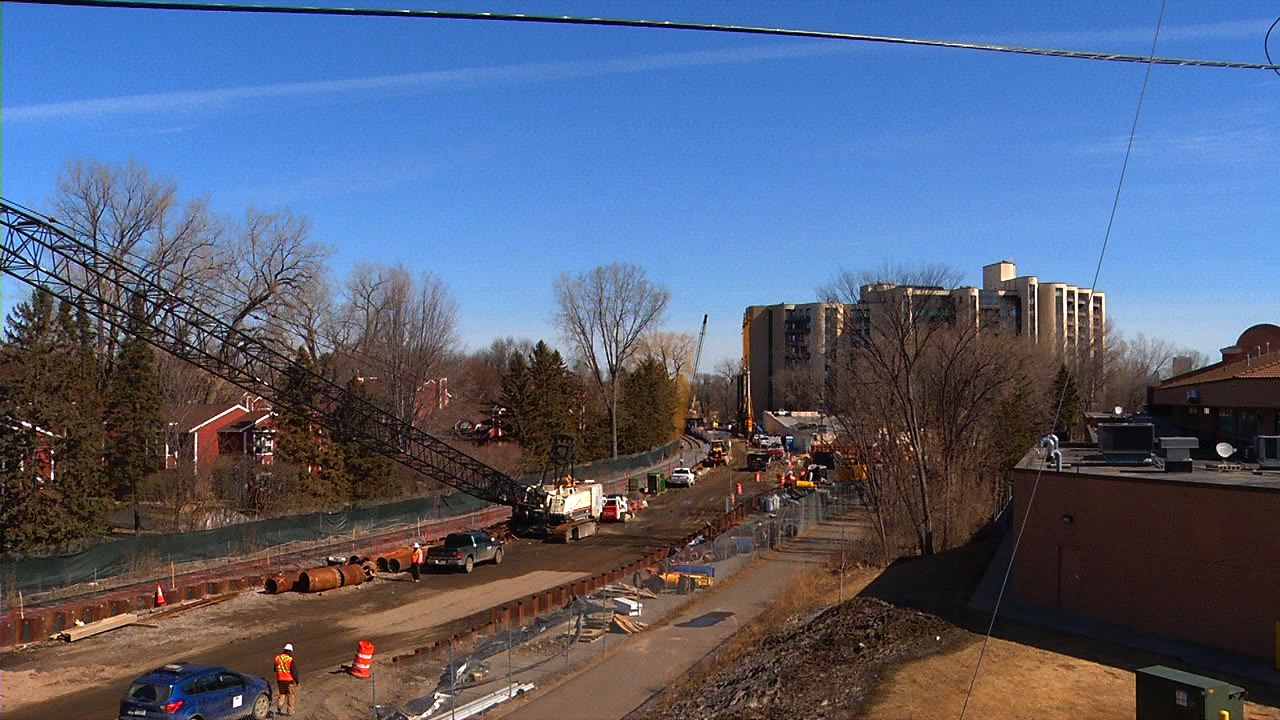As light rail construction resumes at troubled ‘pinch point,’ project managers won’t make key report public
[anvplayer video=”5116366″ station=”998122″]
Work is finally resuming on a small but critical section of the Southwest light-rail project that has been on hold since late January.
Crews paused the construction of a tunnel along the Kenilworth corridor in Minneapolis after cracks appeared in the Cedar Isles condo buildings. The problem-plagued section is largely blamed for delays and cost overruns on the project that is now expected to cost taxpayers $2.75 billion.
Russell Palma is one of the condo owners who first warned planners about potential problems nearly a decade ago.
“They’re really taking it more seriously now, and they have a lot better monitoring,” Palma said.
But he and others say they are not satisfied with assurances that there won’t be any additional damage to their buildings now that construction has resumed, in some cases, just inches from their homes.

Southwest LRT construction underway (KSTP)
“I think that they’re going to try to do what they can to mitigate damage, but I think it’s inevitable that more damage will be done,” Palma said.
A private engineering firm, Socotec, minimized the role that construction played in the damage. The firm made a presentation to condo owners in which it declared that it was safe for the Metropolitan Council to restart construction in the area.
“The conclusion coming that, ‘yes, it is safe for the project to go forward’ and that the building won’t be compromised is comfort from our point of view,” Zelle said. “We want to continue leaning in to make sure residents have whatever information they need from the engineers.”
But when 5 INVESTIGATES requested a copy of the full engineering report that was the basis of Socotec’s presentation to homeowners, lawyers for the Met Council refused, calling the study of the taxpayer-funded rail project “private data.”
Dan Abelson, associate general counsel, added in an email that the full engineering report is “highly technical expert work product, which without further expert explanation likely will not be meaningful to the public.”
Jane Kirtley, a professor at the University of Minnesota and an expert in the state’s data practices law, called that response “pure contempt for the public.”
“It’s this notion that information is just too dangerous to get in the hands of the public. There’s no excuse for that,” Kirtley said. “It isn’t up to them to decide whether we, the public, can interpret what these documents mean or not.”
Palma, a retired physics professor, is among those calling on the Met Council to be more transparent.
“The idea that somehow this report is so technical that none of us could make heads or tails out of it is just sort of a fantastical explanation,” Palma said. “Their lack of transparency is really reinforcing the doubts that we have about the validity of the whole exercise.”
The Met Council and other project managers in charge of the Southwest light-rail extension could have to provide more information to the Office of the Legislative Auditor, Judy Randall.
Randall confirmed on Friday that her office is still conducting two projects related to Southwest light-rail construction.
The first findings could be released sometime this summer.
“This is a huge project that is dealing with delays and cost overruns. It’s already very controversial,” Kirtley said. “The public has a very strong interest in knowing what’s going on here.